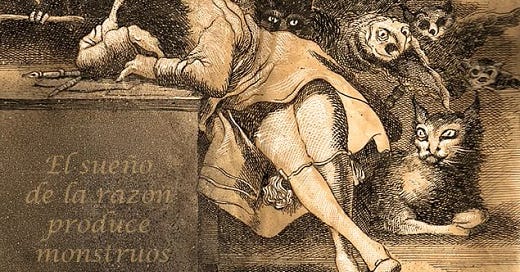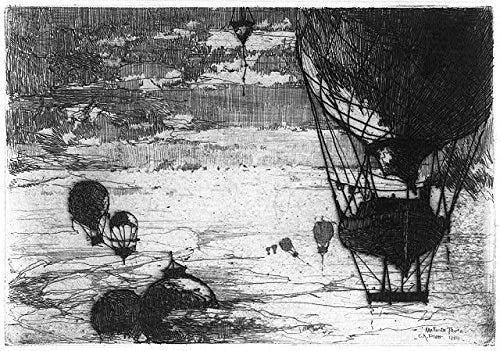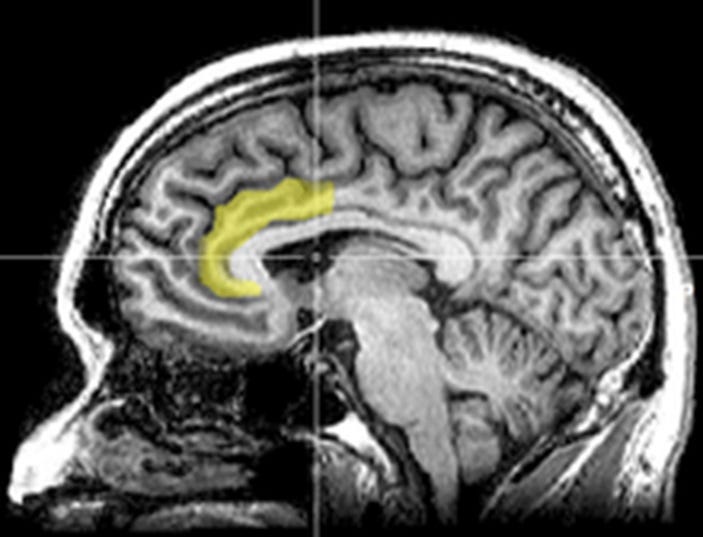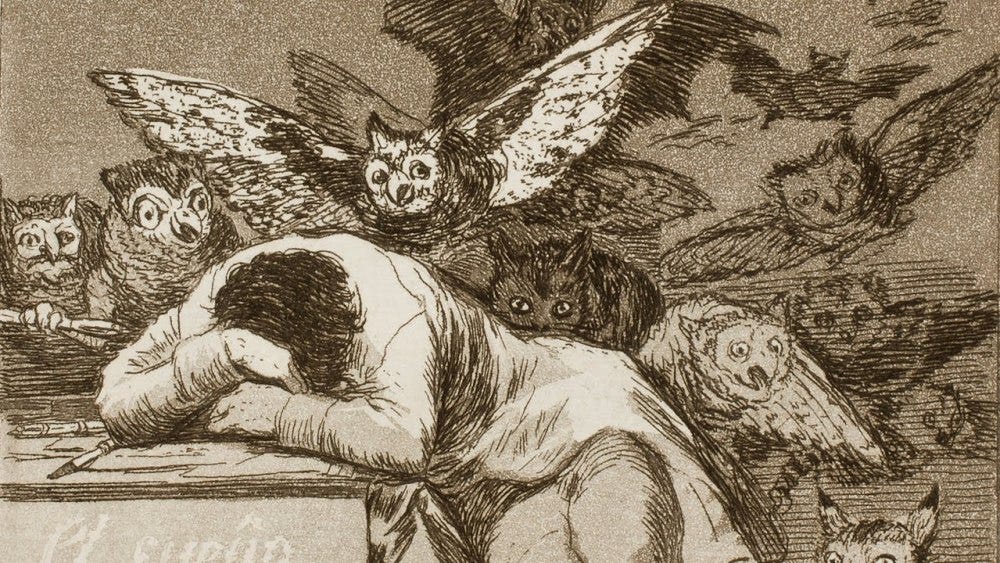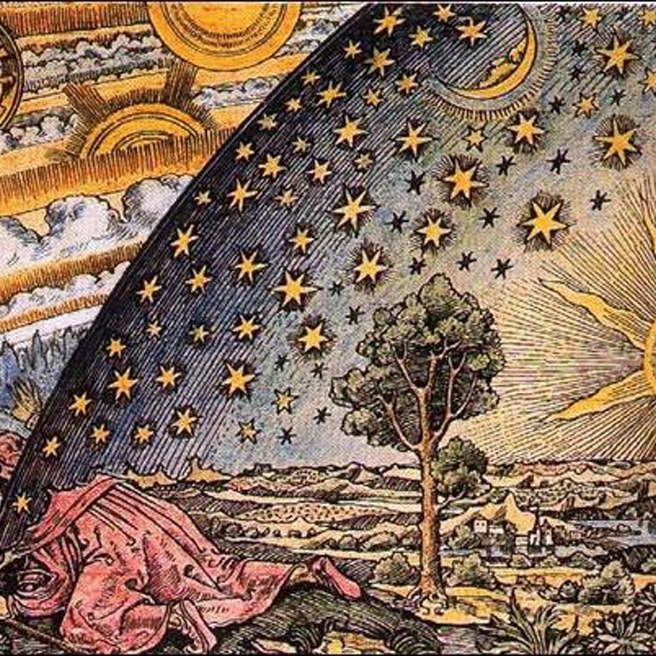“The Sleep of Reason Produces Monsters” by Francisco Goya (1799)
What say of it? what say CONSCIENCE grim, That spectre in my path?
-Chamberlayne’s Pharonnida
The purpose of this paper is to debunk the myth surrounding Poe; that he was just a mere writer of horror and that he had an unhealthy obsession with the mad and the morbid…since isn’t that all he ever wrote about? Not only is Poe associated with the mad but many think he must have been mad himself, since in order to portray madness with such depth of understanding, it is commonly thought that one must partake in that very thing. Further claims conclude that Poe was an alcoholic and gambler, thus sharing in the qualities of many of the characters he chose to write about.
Therefore, the narrative has been that while Poe was a gifted and intelligent writer, he was also deeply disturbed, and that his stories reflected the inner turmoil and conflict he suffered within himself against the demons that he was so evidently battling. Thus, reading his stories of horror are entertaining displays and insights into madness, but at best, are an interesting study of psychology into the criminally insane. Otherwise, there is no other worth or value to be found in them, and for the majority of his readership, Poe’s short stories are rather likened to a dark dessert that is to be voraciously devoured.
Well, I disagree. In this paper I will present a rebuttal to these popular opinions about Poe, that what seems to be Poe’s unhealthy obsession with the criminally insane is in fact an intervention into the mind of his readership. What many of us have been guilty of when attempting to describe Poe, is the failure to ask ourselves the questions: “Well, why do we find his stories fascinating and entertaining? What draws us to the supposed horror?” Many of the characters developed in his stories, despite having done terrible acts, have often a degree of relatability when their inner thoughts are shared with us. Is he trying to humanise the diabolic and make us feel sympathy for its crimes? Or is he revealing a part of ourselves that we were not fully conscious of beforehand, and that we MUST be conscious of in order to avoid our own self destruction?
Mellonta Tauta
Before I go into an investigation of one of Poe’s most famous short “horror” stories, I wanted to quickly discuss with you the last essay Poe wrote at the end of his life titled Eureka, of which Mellonta Tauta was published as a stand-alone segment in 1849. In this short story the narrator is speaking from the future (April 1, 2848 to be exact). The narrator goes on in a letter he is writing to a friend how history (basically the time of Poe) compares with that of the future (or present time of the narrator). In his letter, he compares various things from the past and future and what he thinks of them. Sometimes he expresses a conclusion we can agree with and others times not, the reader must decide for themselves what to do with this.
In one of the sections which I want to go over with you in detail, the narrator brings up two methods of investigation; a priori (deductive) and a posteriori (inductive) thinking.
“…the first aeronaut, maintained the practicability of traversing the atmosphere in all directions…he was scarcely hearkened to at all by his contemporaries, who looked upon him as merely an ingenious sort of madman, because the philosophers(!) of the day declared the thing impossible.
Really now it does seem to me quite unaccountable how any thing so obviously feasible could have escaped the sagacity of the ancient savans. But in all ages the great obstacles to advancement in Art have been opposed by the so-called men of science. To be sure, our men of science are not quite so bigoted as those of old:—oh, I have something so queer to tell you on this topic.
Do you know that it is not more than a thousand years ago since the metaphysicians consented to relieve the people of the singular fancy that there existed but two possible roads for the attainment of Truth! Believe it if you can! It appears that long, long ago, in the night of Time, there lived a Turkish philosopher (or Hindoo possibly) called Aries Tottle [Aristotle]. This person introduced, or at all events propagated what was termed the deductive or a priori mode of investigation. He started with what he maintained to be axioms or “self-evident truths,” and thence proceeded “logically” to results. His greatest disciples were one Neuclid [Euclid], and one Cant [Kant].
Well, Aries Tottle flourished supreme until advent of one Hog [Francis Bacon], surnamed the “Ettrick Shepherd,” who preached an entirely different system, which he called the a posteriori or inductive. His plan referred altogether to Sensation. He proceeded by observing, analyzing, and classifying facts-instantiae naturae, as they were affectedly called—into general laws.
Aries Tottle’s mode, in a word, was based on noumena; Hog’s on phenomena. Well, so great was the admiration excited by this latter system that, at its first introduction, Aries Tottle fell into disrepute; but finally he recovered ground and was permitted to divide the realm of Truth with his more modern rival. The savans now maintained the Aristotelian and Baconian roads were the sole possible avenues to knowledge.”
– Edgar Poe’s Mellonta Tauta
Before we go any further, let’s review the definitions of a priori (meaning “from the earlier”) and a posteriori (meaning “from the latter”) as per what Poe describes in Mellonta Tauta:
A Priori (Deductive thought); is what he (Aristotle) maintained to be axioms or ‘self-evident truths’, and thence proceeded ‘logically’ to results.
A Posteriori (Inductive thought); his (Francis Bacon) plan referred altogether to Sensation. He proceeded by observing, analyzing, and classifying facts – into general laws.
This may appear as mere detail or at least a rather innocent way of organising thinking, but these two methods of thought have been dominant for centuries and still dominate today. For instance, the present day university system continues to trumpet a priori and a posteriori as the only two methods of investigation accessible to the mind. It is thus believed that it is only through deductive or inductive thinking that we are able to formulate an unbiased, ‘objective’ series of facts. If this is the dominant thought today, we had better make sure that we are able to know that it is a good thing and not take it for granted due to centuries of tradition.
In Mellonta Tauta, Edgar Poe goes on to describe how a priori thought is akin to a form of creeping, whereas a posteriori thought is akin to crawling, but what we actually desire is to soar. Is ‘to soar’ possible for us in attaining knowledge? Why do you think Poe was putting so much focus and criticism on these two forms of investigation? What did Poe mean when he wrote “But in all ages the great obstacles to advancement in Art have been opposed by the so-called men of science.”? If you are not certain of the answers to these questions, keep them in mind as we go further and I will address them at the end of this paper.
For those who are not already aware, as we get to know Poe better we will find that this is the focal point for every short story he has ever written. The theme of comparing deductive and inductive thought with another form of thought, which will remain unnamed for now. Thus, what may at first seem like an odd insight into the mad by Poe, may in fact be the predictable outcome of someone who adheres to an extreme form of deductive or inductive thinking. In fact, I will make a point of it.
The Study of Phrenology: what governs the human mind?
In The Imp of the Perverse, the short story of horror we will be later investigating, Poe brings up the ‘science’ of phrenology, and thus it is worth saying something on what this subject was and how it influences our present day.
Phrenology was considered a form of science and hit its peak in popularity during 1810-1840, basically most of Poe’s adulthood. The brain was divided into 27-43 ‘organs’ and these individual ‘organs’ represented personality/psychological attributes. By measuring the size of the skull, areas of the skull that protruded were considered dominant attributes and indented regions were considered weak attributes. This ‘science’ was used in psychology, especially to identify the insane and the criminal.
Figure 1 is an image taken from a phrenology textbook, depicting what is supposed to be the hallmark of a criminal head shape, with 5 specific regions protruding from the skull. It was thought that the more it protruded the greater the degree of criminal impulse.
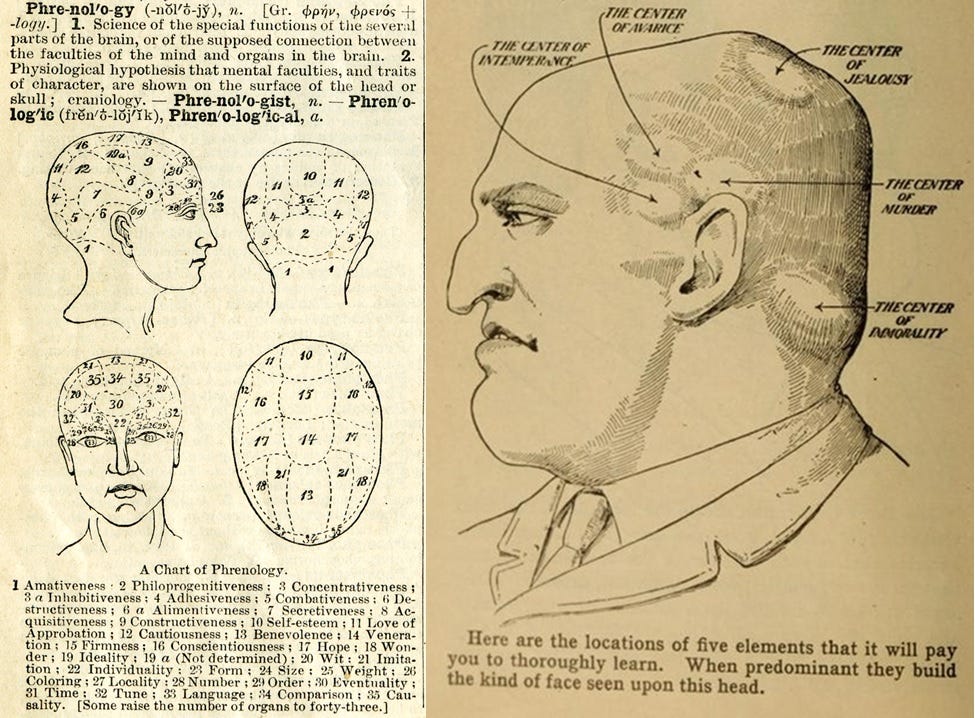
In Franz Joseph Gall’s (the founder of phrenology) book “Naturalist of the Mind, Visionary of the Brain” Gall made the claim that moral and intellectual faculties that governed impulses were innate. In other words, people were born with their moral character and intelligence. For example, if you were a thief, it was because you were born with a predisposition to an impulse of deceitfulness.
Phrenology was used not only in court cases to determine whether someone was guilty but how long their prison sentence should be and whether there was a possibility of rehabilitation. It was thus quite influential and prominent and was used up until the 20th century in court cases, both by the Nazis and American eugenicists alike.
The thought behind phrenology was that you could not ultimately change a person’s psychological attributes and thus their impulses. One could, if anything, redirect the ‘faulty’ behaviour so that it could be used as something useful in society. Examples from phrenology texts asserted that if one had a homicidal impulse, this person would always have this impulse, however, if they were to find a station in society that could fulfill or satiate this impulse (such as a butcher or an executioner), such a person could possibly avoid committing the murder of a human being.
It is important to note that the subjects which phrenologists selected to measure the undesirable or dysfunctional traits were from poor areas that were known for high levels of crime. Inversely, when investigating the more desirable and functional traits they would measure the heads of people who were deemed high-achievers that had a respected station in life. This approach therefore carried much bias. There was no aspect of a ‘double-blind study’ and it was all too easy for phrenologists to look for confirmation of biases rather than to openly investigate actual causality of personality and morality.
Phrenology Today
So, are we much more advanced in our thinking today as to what governs human impulsivity? Well, sadly the answer is that not much has changed in the philosophy of modern neuroscience. In fact, many neuroscientists credit Dr. Gall as the founder for today’s work on the human mind and brain.
For example, Proceedings of the 2013 National Academy of Sciences suggests that forecasting future criminal behaviour could become a reality in the near future. According to their study, they have found the first evidence that brain scans might be used to both predict who will be likely to commit a crime and also how long it will be before that person commits a crime. This prediction is based on the activity in a region of the brain called the anterior cingulate cortex.
During the scan, subjects were asked to press a button in response to a stimulus on a screen, except when a certain symbol also appeared, in which case they were to refrain from pressing the button. It was found that criminals couldn’t help but press the button either way, and that they were more impulsive than the average person. From these results, it was concluded that the part of their brain responsible for stopping an action may be deficient, that is, once an impulsive person gets started on a criminal action, even if they realise potential negative consequences, they cannot stop themselves.
Cannot stop themselves! Really think about the consequences of such a statement. If this is true, then there is no “salvation for the damned” so to speak. There is no possibility of redemption and no avoidance of one’s own tragedy. Fate has been selected upon you at birth, and there is nothing you can do to avoid it or change that course. Free will, remorse and forgiveness are almost non-entities in this line of thought.
Let us look very briefly at another recent example. During the 1960s and 1970s, there was a popular thought that the abnormal XYY karyotype (where a male carries an extra Y chromosome) was believed to be the genetic cause for sociopaths and serial killers.
The Y chromosome is the male-determining chromosome; all men have XY chromosomes and all women have XX chromosomes. It was therefore thought that males who carried an extra Y (male) chromosome were more aggressive and had an increased impulsivity for extreme violence. However, it was discovered by the late 1970s that there was actually no basis for this association and that much of the “evidence” for this argument was from biased reports by scientists imposing links between actual physical traits and criminal behaviour they claimed was rooted in their XYY karyotype.
In addition, the only males used in these studies with the XYY karyotype were already incarcerated. There were no investigations into males with the same karyotype who had not been incarcerated! After decades of ‘analysis’, the only trait that was conclusively found consistent in the XYY karyotype were that these men tended to be taller than the average male.
Despite there, to this date, never being any presentation of evidence confirming this theory of innately pre-determined impulsivity and morality, the idea that we can make predictions on someone’s intelligence, personality and morality from biological material, is still believed in popular as well as academic science today.
We continue to feel secure in our so-called non-bias approach to scientific investigation using these two modes of thought, apriori and a posteriori, and yet, we are not free of biased error even in recent history. There seems to be an almost over-ridding desire to have faith in the concretised conclusions that are formed from these two modes of investigation, despite the magnitude of error that has resulted. The same dilapidated hypothesis, is used in a never ending quest to search for results that will confirm a desired conclusion, despite its findings repeatedly indicating something contrary. It is as if the thought of choice in the matter were something too terrifying to seriously consider, and that it is much more comforting to believe that criminal traits must be something we can detect and categorise materially so that everyone else can feel at ease that they are indeed ‘normal’ and need not worry that they could ever commit actions of deviance or destruction.
Thus, the question still stands: “Does an individual have a choice in whether they commit a crime?“ This is where Poe’s The Imp of the Perverse comes in.
The Imp of the Perverse
At the very beginning of Poe’s short story “The Imp of the Perverse,” we are confronted with the subject of the root of impulsivity, “the prima mobilia of the human soul”. The narrator goes on to state that not only the moralists have failed in determining its cause, but so have the phrenologists:
“In the pure arrogance of the reason, we have all overlooked it. We have suffered its existence to escape our senses, solely through want of belief –of faith…
It cannot be denied that phrenology and, in great measure, all metaphysicianism have been concocted a priori. The intellectual or logical man, rather than the understanding or observant man, set himself to imagine designs –to dictate purposes to God. Having thus fathomed, to his satisfaction, the intentions of Jehovah, out of these intentions he built his innumerable systems of mind.…It would have been wiser, it would have been safer, to classify (if classify we must) upon the basis of what man usually or occasionally did, and was always occasionally doing, rather than upon the basis of what we took it for granted the Deity intended him to do. If we cannot comprehend God in his visible works, how then in his inconceivable thoughts, that call the works into being? If we cannot understand him in his objective creatures, how then in his substantive moods and phases of creation?
Induction, a posteriori, would have brought phrenology to admit, as an innate and primitive principle of human action, a paradoxical something, which we may call perverseness, for want of a more characteristic term. In the sense I intend, it is, in fact, a mobile without motive, a motive not motivirt. Through its promptings we act without comprehensible object; or, if this shall be understood as a contradiction in terms, we may so far modify the proposition as to say, that through its promptings we act, for the reason that we should not.”
The narrator is introducing an explanation for impulsivity that he thinks has been overlooked by all scientists and philosophers up to this point, who depended on an a priori method, that is the assumption that there needed to be an explanation based on their pre-conceived ‘order of things’. He labels the root of impulsivity perverseness. It is something, he stresses, that could only have been recognised or identified using the a posteriori method, since this impulse of perverseness has no reason or purpose for its existence in our behaviour, but rather, it compels us to do what we know we should not do. This is in fact what he claims to be the problem with a priori thinkers, who are so consumed with what they guess to be God’s intention that they completely miss out on reality all together. He goes on to say:
“In theory, no reason can be more unreasonable; but, in fact, there is none more strong. With certain minds, under certain conditions, it becomes absolutely irresistible. I am not more certain that I breathe, than that the assurance of the wrong or error of any action is often the one unconquerable force which impels us, and alone impels us to its prosecution.
Nor will this overwhelming tendency to do wrong for the wrong’s sake, admit of analysis, or resolution into ulterior elements. It is a radical, a primitive impulse – elementary.
…It follows, that the desire to be well must be excited simultaneously with any principle…but in the case of that something which I term perverseness, the desire to be well is not only not aroused, but a strongly antagonistical sentiment exists.“
At this point we should be asking ourselves who is this speaker? Do you think he is making a good point? Is there such a nature as perverseness as he is describing? An imp of the perverse so to speak that causes you to do something almost against your will which will cause you some degree of detriment and even your ruin? That there is no reason we can use to justify such an impulse? And that rather we are lured to act specifically for the reason that we should not?
For those who have not read The Imp of the Perverse or need to refresh their memory, I highly suggest that they read the rest of the text cited below. This way the ending is not ruined for you, and you will also be better able to follow the discussion afterward on what Poe intended with this short story.
“Examine these and similar actions as we will, we shall find them resulting solely from the spirit of the Perverse. We perpetrate them merely because we feel that we should not. Beyond or behind this, there is no intelligible principle: and we might, indeed, deem this perverseness a direct instigation of the arch-fiend, were it not occasionally known to operate in furtherance of good.
I have said thus much, that in some measure I may answer your question — that I may explain to you why I am here — that I may assign to you something that shall have at least the faint aspect of a cause for my wearing these fetters, and for my tenanting this cell of the condemned. Had I not been thus prolix, you might either have misunderstood me altogether, or, with the rabble, have fancied me mad. As it is, you will easily perceive that I am one of the many uncounted victims of the Imp of the Perverse.
It is impossible that any deed could have been wrought with a more thorough deliberation. For weeks, for months, I pondered upon the means of the murder. I rejected a thousand schemes, because their accomplishment involved a chance of detection. At length, in reading some French memoirs, I found an account of a nearly fatal illness that occurred to Madame Pilau, through the agency of a candle accidentally poisoned. The idea struck my fancy at once. I knew my victim’s habit of reading in bed. I knew, too, that his apartment was narrow and ill-ventilated. But I need not vex you with impertinent details. I need not describe the easy artifices by which I substituted, in his bed-room candle-stand, a wax-light of my own making, for the one which I there found. The next morning he was discovered dead in his bed, and the Coroner’s verdict was, — “Death by the visitation of God.”
Having inherited his estate, all went well with me for years. The idea of detection never once entered my brain. Of the remains of the fatal taper, I had myself carefully disposed. I had left no shadow of a clue by which it would be possible to convict, or even to suspect me of the crime. It is inconceivable how rich a sentiment of satisfaction arose in my bosom as I reflected upon my absolute security. For a very long period of time, I was accustomed to revel in this sentiment. It afforded me more real delight than all the mere worldly advantages accruing from my sin. But there arrived at length an epoch, from which the pleasurable feeling grew, by scarcely perceptible gradations, into a haunting and harassing thought. It harassed because it haunted. I could scarcely get rid of it for an instant. It is quite a common thing to be thus annoyed with the ringing in our ears, or rather in our memories, of the burthen of some ordinary song, or some unimpressive snatches from an opera. Nor will we be the less tormented if the song in itself be good, or the opera air meritorious. In this manner, at last, I would perpetually catch myself pondering upon my security, and repeating, in a low, under-tone, the phrase, “I am safe.”
One day, whilst sauntering along the streets, I arrested myself in the act of murmuring, half aloud, these customary syllables. In a fit of petulance, I re-modelled them thus: — “I am safe — I am safe — yes — if I be not fool enough to make open confession!”
No sooner had I spoken these words, than I felt an icy chill creep to my heart. I had had some experience in these fits of perversity, (whose nature I have been at some trouble to explain,) and I remembered well, that in no instance, I had successfully resisted their attacks. And now my own casual self-suggestion, that I might possibly be fool enough to confess the murder of which I had been guilty, confronted me, as if the very ghost of him whom I had murdered — and beckoned me on to death.
At first, I made an effort to shake off this nightmare of the soul. I walked vigorously — faster — still faster — at length I ran. I felt a maddening desire to shriek aloud. Every succeeding wave of thought overwhelmed me with new terror, for, alas! I well, too well understood that, to think, in my situation, was to be lost. I still quickened my pace. I bounded like a madman through the crowded thoroughfares. At length, the populace took the alarm, and pursued me. I felt then the consummation of my fate. Could I have torn out my tongue, I would have done it — but a rough voice resounded in my ears — a rougher grasp seized me by the shoulder. I turned — I gasped for breath. For a moment I experienced all the pangs of suffocation; I became blind, and deaf, and giddy; and then some invisible fiend, I thought, struck me with his broad palm upon the back. The long-imprisoned secret burst forth from my soul.
They say that I spoke with a distinct enunciation, but with marked emphasis and passionate hurry, as if in dread of interruption before concluding the brief but pregnant sentences that consigned me to the hangman and to hell.
Having related all that was necessary for the fullest judicial conviction, I fell prostrate in a swoon.
But why shall I say more? To-day I wear these chains, and am here! To-morrow I shall be fetterless! — but where?
So what was that all about? Well, keep in mind that it is no coincidence that Poe starts off this short story by discussing both a priori and a posteriori thinking, and that in EVERY short story he has ever written he is always addressing what is the proper mode of investigation to determine what is the truth. Thus, I think it is fitting that we here embody the character of Inspector Dupin, which is really the only Poe character to have shown us an effective mode of investigation, in reviewing this piece that Poe has just concocted. As with any Poe story, there are clues given as to what the outcome of the story will be. That in this case, we are given indications that the narrator we have been listening to is not of sound mind. Let us start our investigation.
At the very beginning of the short story the narrator states:
“In the pure arrogance of the reason, we have overlooked it. We have suffered its existence to escape our senses, solely through want of belief –of faith
If we cannot understand God in his visible works, how then in his inconceivable thoughts? If we cannot understand him in his objective creatures, how then in his substantive moods and phases of creation?”
Remember, this narrator has stated that he has found the cause for this impulsive behaviour perverseness, which has no purpose. The narrator states that, until now, the cause of impulsive behaviour could not be determined because it had been assumed that it had a purpose. Thus the nature of perverseness was overlooked since there was a desire, by both these scientists and philosophers, to believe– to have faith that everything must have a purpose. In addition, the narrator goes on, if we cannot understand God, then the understanding of purpose is outside of us. And if we cannot know the mind of God, we ultimately cannot have a relationship to God.
The narrator goes on to describe three examples of perverse impulse: circumlocution, procrastination and being drawn towards the edge of an abyss. He makes the point, that in every one of these examples there is no purpose for why we have such an impulse, in fact, it is never to our advantage and yet we are urged to do it anyway. Of the third example, at the edge of the abyss, he states:
“There is no passion in nature so demoniacally impatient, as that of him who, shuddering upon the edge of a precipice, thus meditates a plunge. To indulge, for a moment, in any attempt at thought, is to be inevitably lost; for reflection but urges us to forbear, and therefore it is, I say, that we cannot.“
Interestingly, the narrator seems to think that the use of thought would inevitably cause one to be lost to this impulse of perverseness. That the act of thought itself, causes us to be utterly helpless against acts of perversity. This seems to be a rather contrary statement! Let us read on to get a better idea from the narrator:
“No sooner had I spoken these words, than I felt an icy chill creep to my heart. I had had some experience in these fits of perversity…and I remembered that in no instance I had successfully resisted their attacks.
…
I felt a maddening desire to shriek aloud. Every succeeding wave of thought overwhelmed me with a new terror, for, alas! I well, too well, understood that to think, in my situation, was to be lost.“
Recall, that this is now after the narrator has committed the murder and inherited the victim’s estate. He claims that he felt perfectly well for years after the act of murder, but gradually an unsettling desire was creeping into him and growing stronger… the mad urge for confession! He goes on to describe these urges as fits of perversity and like an icy chill creeping into his heart. He adds that he had never fully resisted any of these attacks, but knew that he had to at all cost avoid the act of thinking, or be completely lost to these fits of perversity.
Interestingly the narrator has described his urge for confession as the perverse impulse and not the act of murder itself! What is this icy chill in his heart? Could it be a sense of terrible wrong that he has committed?
“For a moment I experienced all the pangs of suffocation; I became blind, and deaf, and giddy; and then some invisible fiend, I thought, struck me with his broad palm upon the back. The long imprisoned secret burst forth from my soul.
But why shall I say more? Today I wear these chains, and am here! Tomorrow I shall be fetterless! –but where?”
When the narrator finally does confess in public, he describes it as the feeling that some fiend (the imp) had struck him on the back and the words of confession just fell out of him. It was an impulse that he could not resist. The whole story has been the narrator talking from a prison cell, waiting for the “hangman’s justice” the next morning.
So what are we to make of all of this? Well, interestingly Poe has described that the only impulse we really cannot deny and that we have no control over is aligned with morality and takes the form of conscience within our minds. What many readers misunderstand about The Imp of the Perverse, is that it is not about a ghoulish crime that the character cannot refrain from committing, but rather it is about the act of confession that its character is powerless in resisting. The entire time that the narrator is desperately avoiding the acts of thought and reflection, he is actually avoiding his own conscience.
Poe has actually flipped the whole discussion of what governs and motivates criminal behaviour; that the desire to commit a crime is not due to an external force or a pre-destined biological nature but rather due to a disconnect from one’s conscience! This is very much from the same thread as when St. Augustine states that darkness can only exist in the absence of light, but light is independent of darkness and exists on its own. Thus, anyone is capable of committing heinous acts, if they break from this within themselves. It is a decision, it is your decision, as to what your relationship to your conscience is.
If this seems to be a far stretch for you, look no further than A Tell Tale Heart, William Wilson, and The Black Cat which are three other short stories by Poe that are about the exact same theme, all three of the characters are undone at the end by their conscience, which they perceive as an outer body phenomenon, just as in The Imp of the Perverse. They have all become so detached from their own conscience that one perceives their conscience in the form of an imp, the other as the beating heart of the old man they murdered, another as a black cat that cannot be killed, and in William Wilson he sees it in the form of an imaginary twin.
So if the answer to these questions of the human mind could never be found with the sole use of either a priori or a posteriori lines of investigation, whose adherents Poe refers to as these so-called men of science who stand in opposition to the advancement of Art, than what is the right method? Well, it is not that a priori or a posteriori methods have no use, but rather that they were never meant to govern reason and certainly not our conscience. Whether we chose to operate entirely by faith on “self-evident truths” as in the case of a priori thought or depend on our “senses” to dictate to us a reality as in the case of a posteriori thought, we will never be able to discover a governing truth, which can only be known through the act of moral reason… otherwise it is like trying to hit a target in the dark. This act of moral reason is best described by Plato’s discussion of the hypothesis of the higher hypothesis, and in Schiller’s philosophical writings which I will go through in detail in an upcoming paper.
Cynthia Chung is the President of the Rising Tide Foundation and author of the books “The Shaping of a World Religion” & “The Empire on Which the Black Sun Never Set,” consider supporting her work by making a donation and subscribing to her substack page Through A Glass Darkly.
Also watch for free our RTF Docu-Series “Escaping Calypso’s Island: A Journey Out of Our Green Delusion” and our CP Docu-Series “The Hidden Hand Behind UFOs”.

